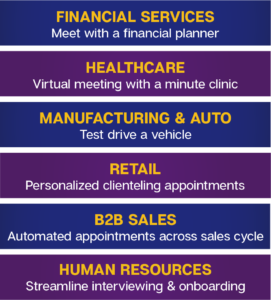In today’s new normal, many companies are empowering their customer-facing employees to deliver a high-quality service and sales experience. Much of the time, this requires a seamless way for customers to book appointments with sales and service agents.
If your customers or prospects rely on scheduling appointments to service or sell to their customers, they may need guidance on choosing between Salesforce’s two “scheduling” products: Lightning Scheduler and Field Service Lightning.
At the Mindtree Salesforce Practice, we have deep experience with both products. Our customer implementations have given us insights on which tool is the right fit for a given job and we’re pleased to share some of those valuable insights with you as you work to sell these deals.
Lightning Scheduler was purposely built for appointment booking use cases. While Field Service Lightning is traditionally used for field service operations, it can also support some appointment booking use cases. So, when should a company pursue one or the other? To find the answer, let’s evaluate what type of scheduling a company is trying to implement, and determine how mature of a scheduling tool they’ll need.
When to use Field Service Lightning: The easy decisions
Do they need to schedule pieces of equipment or machinery? Does the service resource travel? Is the travel calculation important when deciding the best resource to assign the job? If the answer is yes to any of these questions, the scheduling project requires Field Service Lightning (FSL).
FSL is an enterprise-grade field service solution that allows service managers to optimally schedule the right resources (persons or equipment), for the right location, at the right time.
The typical use case for FSL is that of the cable company providing in-home service or an infrastructure manufacturer servicing their telecom clients. Whenever a field engineer or mobile worker is involved, FSL should be used, as it provides routing capabilities and an offline mobile app for execution of the work.
When to use Field Service Lightning: The tougher decisions
It’s when we a company has to consider appointment booking use cases without field engineers that the decision becomes tougher. Examples of these use cases include:

While Lightning Scheduler was built for non-field-based use cases like these, FSL may sometimes be appropriate to use as well—how does a customer decide then?
FSL allows service to be requested and scheduled just like Lightning Scheduler. However, with simple configurations and powerful out-of-the-box functionality, the FSL data model allows for deeper and more granular resource control. Using tools like the dispatcher console and Gantt view, managers can create and schedule appointments on behalf of the service resources in their territory or working group. Through the Gantt, managers can also view all their resources appointments for a given day/week/month and make changes to many appointments at once. This enhanced manager functionality is not available with Lightning Scheduler.
When to use Lightning Scheduler
Lightning Scheduler leverages a lot of the core FSL data model and functionalities, and it comes with pre-built Flows and Lightning components that can be embedded into a Salesforce Community to handle inbound scheduling with minimal setup.
Generally, Lightning Scheduler is appropriate for companies with less complex service needs. For example, Lightning scheduler does not have a manager-style Gantt view of all service resources, or an ability to easily edit many appointments at once, which is more appropriate for FSL use cases.
For companies where service is auxiliary to other business lines, Lightning Scheduler may be more appropriate than FSL. Some examples include: a local credit union or bank, one-on-one retail or dealer experiences, health or wellness coaching, or even HR appointments. Using Lightning Scheduler, a customer can book an appointment with a home loan officer on any day in the working week, based on the loan officer’s availability. Lightning Scheduler still allows the bank to provide a valuable service to their customers, even without the more advanced FSL capabilities.
Customer success story
| Challenge | Solution | Outcome |
| As part of a digital health experience provider, a weight loss coaching program relied on antiquated legacy systems while trying to help a large influx of people on a daily basis. However, the coaches’ efficiency was limited by the current technology and was disconnected from the parent company systems. | The Mindtree Salesforce Practice implemented Salesforce Health Cloud and Field Service Lightning (FSL) to provide the coaches with a platform to run video coaching sessions with members. Through FSL, Demand Managers are now able to efficiently schedule optimally skilled coaches for group sessions with members. Coaches can also use the Appointment Booking action to book one-on-one appointments, and members are able to book appointments from a 3rd party website, leveraging the FSL API. | The new FSL Scheduling and Appointment Booking solution received overwhelmingly positive feedback from users. The scheduling solution has increased revenue through improved member retention and improved coaching efficiency. |
In summary
Choosing between Field Service Lightning and Lightning Scheduler can be difficult given that they seem so similar on paper. In practice, it is evident that the two tools have strengths when applied to specific use cases and may be weaker in others. Field Service Lightning is a robust solution that can work in almost any service situation; however, if specific requirements are less complex, it may be better to start with Lightning Scheduler.
To learn more, schedule a live demo to discuss both tools in depth and walk through the ideal use cases.

